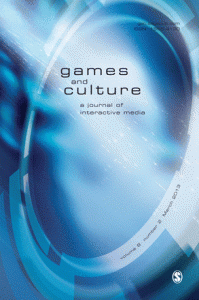Abstract:
This essay makes the argument that the numerous “networks” or “inter/intranetworks” that structure the video game industry have lived local effects for those involved in the production of video games. In particular, this is most visible in the realm of console video game development but is visible in many other contexts as well. It uses the Nintendo Entertainment System (NES) as an index into this complex and highly structured world that frequently disappears from developers perception. The essay uses largely historical data drawn from patent filings, Securities and Exchange Commission (SEC) filings, and court cases to analyze these networks. The essay argues that these inter/intranetworks, as constructed, have been instrumental in the way that the game industry now finds itself structured and that as the industry has “matured,” the networks have become less accessible and less interoperable.
Get It:
Sage Publications
Citation:
O’Donnell, C. (2011). The Nintendo Entertainment System and the 10NES Chip: Carving the Videogame Industry in Silicon. Games and Culture, 6(1), 83-100.

